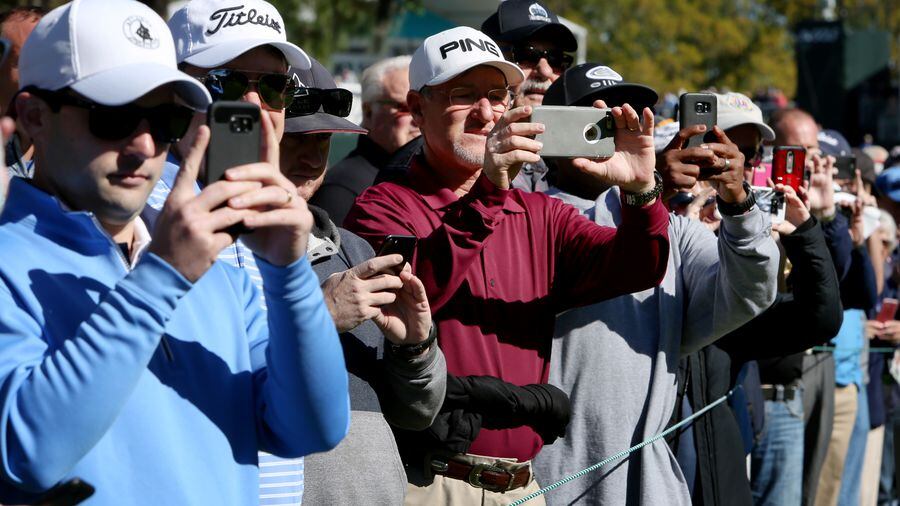From Kieran Clark, GolfShake.com
“I am proud to join LIV Golf and be part of something new that is bringing growth to the sport,” Jon Rahm
There it is yet again. ‘Grow the game,’ a nauseatingly trite phrase routinely deployed to justify any questionable decision, or action in the golf industry. Jon Rahm has shown himself to be just the latest golfing mercenary for whom words are cheap in the pursuit of gargantuan signing bonuses and rich tournament purses.
How can one criticize him for seemingly turning his back on everything he once believed? He is just trying to admirably ‘grow the game.’
Gratefully, this game of golf that is apparently in need of constant growth will happily continue to exist and thrive. It doesn’t even require the input of Rahm, or any other professional on LIV and the PGA Tour who are often united in possessing an overinflated sense of worth.
Regular four-balls will still take place at your local club on a Saturday. Families and friends will be outside enjoying the physical and mental health benefits offered by golf. Keen players will be working tirelessly at the range in that constant search of improvement. The busting communities of golf societies are busy planning their buddy’s trips and girl’s golf getaways for next season.
None of this has anything to do with profiteering, or ‘growing the game.’
The game of golf is not what you see on TV.
Professional golf was always nothing more than a window into the game, but the view it offers is not one that deserves our respect or attention anymore.
Many people have contributed to this regrettable reality, while enriching themselves along the way. The PGA Tour created a monopoly by launching its year-round FedEx Cup schedule, effectively keeping the best players in America, which made the environment untenable for events played outside the United States, weakening historic tournaments in Europe and the national opens of South Africa and Australia.
Was that part of ‘growing the game’ too?
This provided the opportunity for the LIV to emerge to readdress that balance, backed by Saudi Arabia’s seemingly limitless Public Investment Fund and the indulgence of its golf fanatic governor Yasir Al-Rumayyan. What the suits at the PGA Tour never considered was that one day another organization would have the means to buy the weak loyalty of its top players. Breaking Jon Rahm’s professed “fealty” to the established circuit was more expensive than others, but the outcome was exactly the same.
Where it leaves us now is a curious, absurd position where the product that is men’s professional golf has been diluted and weakened beyond recognition, but the players themselves have never been more rewarded financially.
The PGA Tour has thrown money at the FedEx Cup and its Signature Events to the extent that it’s now begging tournament sponsors for more support, while its ‘Player Impact Program’ this year handed a bonus of $100 million divided between 20 players just for sticking around.
Modern tour golf is a recipe for entitlement and not just for the household names. Chris Stroud, who earned over $13m in his career, recently declared,
“The tour has never tried to give back to the players and that the leadership didn’t care about those ranked outside the top 30.”
Everyone (even the LIV defectors) are entitled to seek a better deal for themselves, but where is the perspective to any of this?
Mr. Stroud could walk into any golf club and signing the guestbook would be the only autograph he would be asked for.
But PGA Tour players do have legitimate reasons to question what is going on since the Framework Agreement was announced with the Public Investment Fund in June. This came one year after, PGA Tour Commissioner Jay Monahan weaponized the grief of 9/11 families in a PR move against the Saudis, only to disgracefully betray the trust of those people he used and declare a deal that remains unratified.
Sports Illustrated has now reported that Patrick Cantlay is somehow in a position in that he is driving talks with the Saudis and other potential investors. The American is someone permanently determined to accrue more dollars, presumably to compensate for his complete absence of personality. No wonder Rory McIlroy resigned from the Policy Board.
The future is even murkier than it was before. Rahm may believe that his crossing of the divide could help to push unity, at least when it comes to LIV players representing Europe in the Ryder Cup, but does anyone really care?
When a sport and its participants reek of dishonesty, it ceases to have credibility. When it’s just about the money, it becomes crass beyond measure. Combined those two failings make much of what you see on television meaningless.
Setting aside the moral and sportswashing concerns that instantly turned many people against LIV, for all its hundreds of millions spent, it has failed to gain any traction beyond a tiny niche within the already small niche that is the golf audience.
Like other contracted mouthpieces before him, Rahm was quick to point to the ‘innovation’ and ‘team’ appeals of LIV. Naturally, these came a joint-close second to growing the game in his ranking of motivations and way ahead of the reported £450m he could earn.
These revolutionary innovations appear to be that instead of having 72-holes of stroke play, 54 holes and a shotgun start are sufficient. What a groundbreaking innovation! There is also a separate leaderboard charting the progress of teams that sound like they’re part of a Christmas pub quiz. The Majesticks, The RangeGoats, The Cleeks, The Toilet Seats, I just made up that last one. There really is a team called the Rippers. You’ve got to love the Rippers!
Rahm ludicrously compared this contrived and artificial setup to his childhood football team, Athletic Bilbao, eight-time winners of La Liga who proudly represent the Basque Country by famously only selecting players native to that region. That is team with meaning.
That’s not to say that we don’t require change in the everyday diet of televised events. But it’s a moot point with everything being so irretrievably fractured and in danger of sliding into further public irrelevance. Whatever happens during the coming years, few will be satisfied, apart from the bank managers and agents of players for whom greed is dressed up in that celebrated virtue of ‘growing the game.’
There is a deleted scene from the 1997 epic blockbuster Titanic in which a villainous henchman called Spicer Lovejoy played by the late David Warner decides to pursue the doomed lovers Rose and Jack to get his hands on a priceless diamond in spite of the fact that he is likely facing certain death as the dining room floods around him.
Cameron removed this sequence from the film because the audience wouldn’t believe anyone would actually do that. But it feels somewhat apt for the corporate melodrama that is men’s professional golf. The ship has struck the iceberg, it’s sinking, it cannot be saved, but the characters are getting their hands on what gold they can on the way down to the bottom of the ocean.
DP World Tour star Eddie Pepperrell summed it up best when he recently tweeted,
“Pro golf is on a one-way street to nowhere. Lost its mind, and I’ve lost my respect and love for it.”
He is not alone. But thankfully – despite the noise – showbiz golf really isn’t the game. We can simply ignore it and get on with what truly matters. The friendship, companionship, challenge and rewards that golf enduringly provides.
I look forward to seeing you on the first tee.










